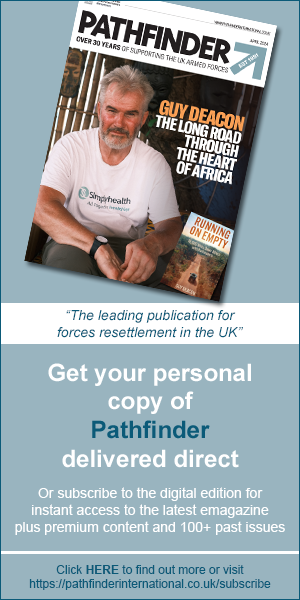The Forces in Mind Trust (FiMT) was established to help Service men and women make a successful transition back to civilian life…
The Forces in Mind Trust (FiMT) is doing and commissioning excellent and necessary work. Established in 2012 with a £35m endowment from the Big Lottery Fund, their stated vision is ‘to be recognised as a credible, independent and influential authority on transition, agile and effective on how we award grants and commission research.’
Over a 20 year period FiMT will be supporting projects that increase the understanding of transition from military to civilian life, including related mental health and well-being issues. They will then utilise the knowledge gained from these projects to advocate change that will improve the chances of a successful transition.
The Trust will also undertake awareness-raising campaigns, provide advice and support to those charities and organisations that directly support the Armed Forces community, veterans, their families and dependants.
Research
Air Vice-Marshal Ray Lock, Chief Executive of the Forces in Mind Trust explained to us the conclusions of a recent study into the implications that transition has for mental health, Forces families, alcohol and interventions, which examined a number of pieces of research already in circulation.
“The study has highlighted three particular areas where there is a gap in understanding in terms of research. The first is how families are affected by transition. The second is the use of alcohol and understanding better the level of alcohol used by those in Service as well as how this affects a successful transition. The third concerns the type of interventions that work best with ex-Service personnel – are they exactly the same as those offered by the NHS or do they need to be more tailored?”
The full findings of the report will be published in the coming weeks and Lock believes that the Trust’s responsibility lies in enabling those who are capable of plugging the gaps in the research to do so. It is envisaged that the types of organisations involved will include the Ministry of Defence, the NHS and Service charities.
Another piece of research commissioned by the Trust concerns Transition Mapping which has looked in detail at the transition process itself and is due to report its recommendations on how this can be improved.
Getting Along With Business
More recently, and something that is certain to be of particular interest to Pathfinder readers, is the work FiMT is doing around employment of Service Leavers. Ray Lock explains: “We want to look in detail at just what understanding the HR departments of commercial organisations have of Service personnel and where there are mismatches in how Service Leavers are presenting themselves and their transferable skills, as well as establishing what it is that employers want.
"We are looking to get important insights into what business expects and use those insights to help Service Leavers better understand how they can get along with businesses and how businesses can better appreciate what they are getting when they hire an ex-military person.”
Adjusting to Civvy Street
The Warrior Programme, another initiative funded by the Forces in Mind Trust, is a non-clinical training and education programme for veterans who are experiencing serious problems adjusting to civilian living. Working in partnership with Southampton University they have undertaken a Randomised Control Trial (RCT) to evaluate the programme’s impact on the transition of Service personnel into civilian life.
The aim of the trial is: to research and validate the techniques used to change individual attitudes and behaviour; to prove the role of the Warrior Programme over the long term: and to provide evidence-based research from which other services can benefit.
Ray Lock believes that this type of work is pivotal for the Trust: "Supporting research into projects such as The Warrior Programme is exactly why we were established. The funding of this Randomised Control Trial in particular will enable us to gain new and evidence-based insights into what contributes to a successful transition."
The Warrior Programme teaches veterans tools and strategies to manage their emotions, reduce anxiety and fear and to improve their confidence in order to acquire focus and clarity for the future. The training begins to instil confidence and resilience, enabling participants to engage more effectively with other agencies which can meet their transition needs relating to housing, welfare and employment, ultimately leading to independence.
John Cummings, Director of The Warrior Programme, commented: "We are delighted that FiMT is supporting our current research project by awarding Warrior a grant to conduct a Randomised Control Trial. This Research is well overdue and without the support and financial backing by FiMT we could not afford to conduct it. Importantly, it will establish best practice through the examination of the effectiveness of new interventions by an academic institution."
Employability
The Trust has recently awarded a grant to Futures 4 Forces, a not-for-profit research organisation, to conduct a qualitative research programme into the employability of ex-Service personnel. The programme will explore the recruitment needs of both large businesses and SMEs throughout the UK and their requirements from ex-Service Personnel.
For the first time this type of research will involve interviewing Senior HR Directors, who will be asked about their experiences and perceptions of the ex-Service personnel’s employability. Extensive research has been conducted into the long-term unemployed and injured ex-Service personnel but so far only limited research has been done into employers’ needs in recruiting Service leavers.
Ray Lock says: “The current economic climate means that the job market is extremely competitive. This type of research into the perceptions of potential employers of ex-Service Personnel has never been done before. This is exactly what FiMT was established to do and we look forward to seeing the research findings, which we will promote widely across the sector."
Futures 4 Forces (F4F) was set up by Andrew Tillard with the aim to support Service leavers and the wider community of ex-Service personnel get into employment. The research team will conduct in-depth interviews with a representative sample across England, Scotland, Wales and Northern Ireland.
Research findings will be available later this year.
For further information about the work of FiMT please visit their website www.fim-trust.org/

















